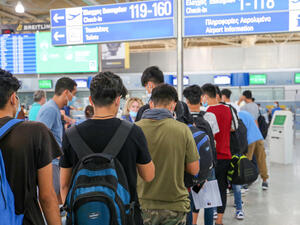Italy: UNHCR deeply concerned about Lampedusa deportations of Libyans
Italy: UNHCR deeply concerned about Lampedusa deportations of Libyans
UNHCR is deeply concerned about yesterday's deportation of some 180 people aboard two flights from the Italian island of Lampedusa to Libya, with an Italian police escort. UNHCR, which has a senior staff member on the island, had requested access to the reception centre, in order to ensure that anyone who wishes to make an asylum claim has the possibility to do so, and that any claims that were made are properly and fairly assessed. That request, which was made in accordance with UNHCR's mandate to protect refugees - including access to asylum seekers and monitoring of asylum systems - has so far been refused by the Italian authorities.
During a similar episode last October, UNHCR was eventually permitted to enter the Lampedusa centre, after more than 1,000 people had been flown back to Libya. UNHCR believed that on that occasion the rushed methods used to sort out people by nationality meant that individuals who might have had a valid claim did not receive a proper assessment. UNHCR fears that the same concerns may apply to this week's developments in Lampedusa. In other words, it is far from clear that Italy has taken the necessary precautions to ensure that it is not sending back any bona fide refugees to Libya, which cannot be considered a safe country of asylum.
UNHCR is also concerned by reports that Libyan officials were flown to Lampedusa and given access to the people in the centre. If there was any Libyan asylum seeker in the group, this would run counter to basic refugee protection principles, and could create valid refugee claims sur place.
Despite efforts to do so, UNHCR was also unable to access the people sent back to Libya in October and therefore is not in a position to say that none of them were refugees nor that none of them subsequently came to any harm. Libya has not signed the 1951 UN Refugee Convention. Nor does it have a functioning national asylum system. In the circumstances, and judging from recent experiences, there is a real risk that refugees who are in need of international protection may be forcibly returned to their homeland.
UNHCR deeply regrets the continued lack of transparency on the part of both the Italian and Libyan authorities, and regrets that as a result suspicions that one or both countries may be in breach of international refugee law will be hard to put to rest. UNHCR also regrets that the Italian authorities have, despite recent experiences, made no attempt to enlarge the reception centre in Lampedusa. With a capacity of a mere 190, the centre is easily overwhelmed, creating an air of crisis that is perhaps not strictly necessary. We believe there are currently more than 630 people in the centre.
Over the past 10 years, Italy has received an average of around 11,000 asylum claims per year - one of the lowest annual totals among the big EU countries.
UNHCR agrees that asylum procedures to determine manifestly unfounded claims should be efficient, and could be subject to a simplified review. It is essential, however, that all asylum seekers have access to an asylum procedure, with the necessary safeguards.
UNHCR stands ready to work with the Italian and Libyan authorities on developing approaches that would better reconcile concerns over irregular migration with the right to seek asylum and the obligation to provide protection to refugees.








